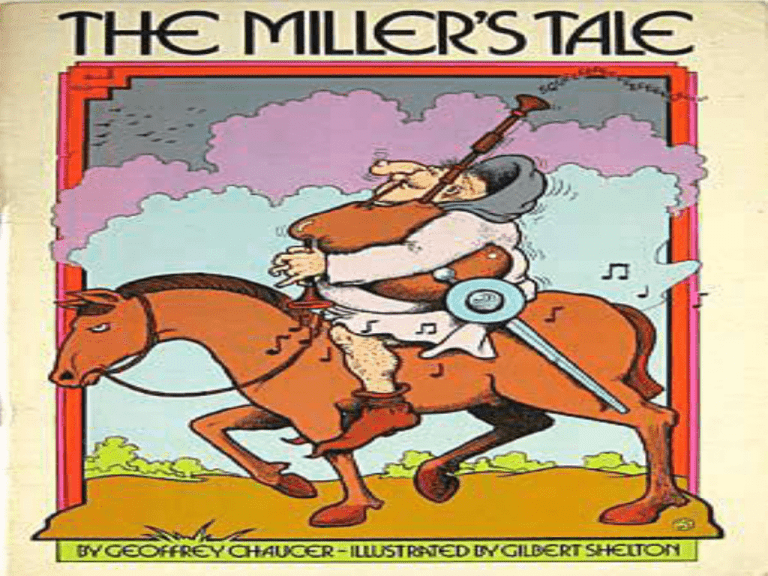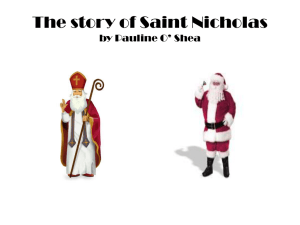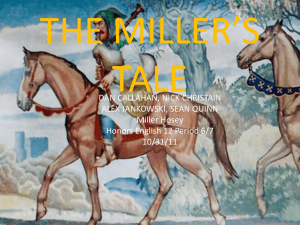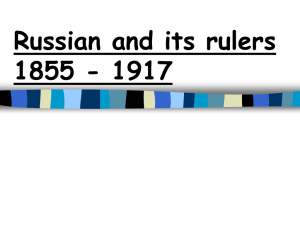
Lines 1-112
A rich carpenter named John lives in Oxford and takes
lodgers into his home.
A poor but clever scholar named Nicholas boards with
him.
The narrator gives us an extensive description of
Nicholas's character. (For more on this portrait, see the
"Character Analysis" section.)
Lines 113-124
•John has married an eighteen-year-old woman
named Alisoun.
He is apparently jealous about her, and keeps her
on a tight leash.
The reason he is so jealous is that Alisoun is much
younger than him, and he fears being made a
"cuckold" by Alisoun cheating on him.
John has never read the proverb by the ancient
Greek philosopher Cato, which says that men
should marry a woman similar to them in situation
and age because youth and the elderly don't mix
well.
Since he has already married Alisoun, though,
John must endure his situation.
Lines 163-198
•One day when John is away in a nearby town,
Nicholas decides to seduce Alisoun.
•He grabs her butt and tells her that unless she grants
him her love, he will die.
•Alisoun leaps away from him and declares that she
will not kiss him.
•She threatens to scream unless Nicholas leaves her
alone.
•Nicholas asks Alisoun to grant him mercy, pleading
with her to have sex with him.
Lines 168-193
•Alisoun relents and grants Nicholas her "love"
(probably meaning sex).
•She warns Nicholas that her husband is jealous. The
two of them must be very careful and secretive about
the affair; otherwise she will be punished.
•Nicholas agrees to wait until John is not around to
have sex with Alisoun again.
•He pats her butt and kisses her some more.
•Nicholas plays his harp.
Lines 199-230
• Alisoun goes to the parish church one day looking very
clean and shiny.
• At the parish church resides Absolon, the parish clerk.
• The narrator gives us an extended description of
Absolon's character. (For more on this portrait, see the
"Character Analysis" section.)
Lines 231-288
• On a holiday, when Absolon is waving incense around
the wives of the parish, he sees Alisoun and takes such
a liking to her that, were he a cat and she a mouse, he
would snatch her up right away.
• So much love has he in his heart for Alisoun that he
takes no offering that day from any of the wives. (This
part is rather unclear: does he do this so that Alisoun
can keep her money?)
• Absolon begins courting Alisoun by singing to her
under the full moon, asking her to take him as a lover.
• John hears Absolon and asks Alisoun if she hears him
too.
• Alisoun replies that she does hear him.
• After that night, Absolon continues his unsuccessful
courtship of Alisoun, kept awake night and day by his
love-sickness.
• Absolon employs many means to try to win Alisoun,
including:
• combing his hair carefully
• enlisting messengers and go-betweens
• swearing to be her servant
• singing like a nightingale
• sending her gifts of sweetened wine, spiced ale, and
cakes
• playing Herod in the local play
• Despite Absolon's best efforts, Alisoun refuses to
become his lover, because her heart already belongs to
Nicholas.
• In fact, Alisoun makes Absolon look like a fool.
• The narrator tells us that Absolon stands no chance
with Alisoun because Nicholas is closer to her and
always in her sight, thus keeping her attention away
from Absolon.
Lines 289-330
• Nicholas and Alisoun make a plan that will enable
them to spend the entire night together in bed without
John's knowledge.
• Nicholas goes into his room, taking with him enough
food and drink for a whole day.
• He tells Alisoun that if John asks about him, she
should say she doesn't know where he is, that she
hasn't seen him all day, she thinks he might be ill, and
even when her maid called for him, she received no
response.
• Nicholas spends the whole Saturday in his room.
• On Sunday, John begins to worry about Nicholas,
wondering aloud if he has died.
• John sends a servant to knock on Nicholas's door.
• The servant knocks hard on Nicholas's door and asks
him how he can sleep the whole day away.
Lines 331-387
• Upon hearing nothing from Nicholas's room, John's
servant peeks through a hole in the wall and sees Nicholas
sitting bolt upright and gaping, as though he's looked too
long at the new moon (meaning, he looks crazed).
• The servant tells John about the condition in which he
found Nicholas.
• John declares that Nicholas must have meddled too much
in astronomy and thus gone mad.
• John says that men should not know too much about God's
secrets: it's much better to be an unlearned man who only
knows his Apostle's Creed.
• He tells about another clerk who spent too much time
•
•
•
•
•
doing astronomy. That clerk was star-gazing in a field
in an attempt to tell the future, and he fell into a pit
instead.
John says he is sorry for Nicholas, who will suffer
because of all his studying.
John tells the servant to push on the door while he
pries at it with a stick.
The servant manages to take the door off by its hinges.
Nicholas is sitting as still as a stone and gazing up at
the ceiling.
John thinks Nicholas is in despair. He shakes him by
the shoulders, pleading with him to wake up.
• He makes the sign of the cross on Nicholas against
elves and demons and says a prayer at the four corners
of the house in an attempt to exorcise from Nicholas
the spirit he thinks has captured him.
• Nicholas appears to wake and sighs, wondering aloud
if the whole world is about to be lost.
• John asks him what he means.
• Nicholas tells John to fetch him a drink, saying that he
wants to speak privately to John about something that
concerns them both.
Lines 388-438
• John brings Nicholas a quart of ale, which the two of
them share.
• After John sits down next to Nicholas, he closes the
door and begins to speak.
• Nicholas makes John swear not to tell anyone else what
he is about to tell him.
• John swears that he won't, and that he is not the type
to betray secrets.
• Nicholas tells John that, in studying astrology, he has
discovered that the following Monday there would be a
flood as big as the one God sent in Noah's time. In less
than an hour of rain, everyone would drown.
• John expresses sorrow over the possible death of
Alisoun, and asks if there is no way to prevent it.
• Nicholas says that there is, but to do it John must rely
upon his counsel.
• Nicholas recites a proverb by Solomon that incites all
things to be worked by counsel and asks John if he
remembers how God saved Noah.
• John replies that he does remember the story of Noah.
• Nicholas asks if John remembers what a hard time
Noah had in getting his whole family on the ark,
especially his wife.
• Nicholas says that what they do, therefore, they must
do quickly
Lines 439-492
• Nicholas advises John to obtain three large tubs for
them to use as boats, and to stock these tubs with
enough food and drink for a day, after which, he
promises, the waters will retreat.
• Nicholas makes John promise not to tell his
servants, but says he can't tell him why this secrecy
is necessary, and that John shouldn't ask about
God's secrets.
Nicholas says if John follows his counsel, he and his
wife will have as great a grace as Noah had – they
will be saved from drowning in the flood.
Lines 493-529
• John leaves the room in a sorry state.
• He explains the situation to Alisoun, who pretends to
believe him and tells him to go ahead quickly in
order to save their lives.
• The narrator comments upon how great a thing
imagination is: so deep can an impression (or
imagining) be that men can die of it.
• John imagines that he can see the flood drowning
Alisoun, which makes him weep.
• John gets three tubs and hangs them from the
rafters of his house, then places ladders next to each
one.
• He places bread, cheese and ale in each tub and
sends his servants off to London.
• John, Nicholas, and Alisoun climb into the tubs.
Lines 530-548
• Nicholas tells everyone to be quiet.
• John sits very still in his tub, saying prayers and
waiting for the rain.
• John falls asleep and begins to snore.
• Nicholas and Alisoun climb down from their tubs and
go to bed together.
• They have sex in John's bed until almost dawn.
Lines 549-578
• Absolon asks a friend if he's seen John recently.
• The friend replies that he has not seen John since
Saturday. He thinks he must have gone out of town
to buy timber.
• Absolon is overjoyed, declaring this the perfect time
to court Alisoun.
• He describes his plan to stand beneath Alisoun's
window at dawn and tell her of his love-longing.
• Absolon says his mouth is itchy, which he believes is
a sign it's in need of kissing.
• Also, he says, he dreamed last night he was at a
feast.
• He says he will sleep for two hours, then wake and
play.
Lines 579-599
• Absolon wakes at cock-crow.
• He dresses himself nicely and chews spices and
licorice to make his breath smell good.
• He goes to the carpenter's house and stands at
Alisoun's window, the bottom of which is only at his
chest because it is so low.
He asks Alisoun to wake and speak to him, claiming
she cares little for his sadness. He describes himself
as a lamb longing for the teat and a turtle-dove, and
says he eats no more than a maid, so strong is his
love-sickness.
Lines 600-614
• Alisoun tells Absolon to go away and let her sleep,
because she loves someone else.
• Absolon asks Alisoun to at least give him a kiss
before he goes.
• Alisoun asks if Absolon will go away if she kisses
him.
• Absolon replies that he will.
• Alisoun tells Absolon to get ready, for she's coming
to the window.
• Alisoun tells Nicholas that soon, he will have a good
laugh.
Lines 614-635
• Absolon gets down on his knees next to the window.
• He says he feels like a lord, and he is certain that
after this kiss, there will be more to come.
• He tells Alisoun he awaits her will.
• Alisoun unbars the window and tells Absolon to
come quickly so the neighbors don't see him.
• Absolon wipes his mouth dry.
• The night is very dark.
• Alisoun puts her "hole" (butt) out the window.
• Absolon kisses it enthusiastically.
• He pulls back, for he thinks he feels a beard –
something rough and long-haired.
• Absolon wonders aloud what he's just done.
• Alisoun laughs and closes the window.
• Nicholas expresses delight about the joke.
Lines 631-686
• Absolon hears Nicholas and declares his intention to
get revenge on Alisoun.
• He washes his lips vigorously with sand, straw, and
wood chips, so disgusted is he by what he has just
done.
• From that moment on, he is healed of his lovesickness.
• He goes across the street to the blacksmith's shop
and knocks loudly on the door.
• The blacksmith answers the door and wonders what
•
•
•
•
Absolon is doing awake so early, speculating that it
must be because of a girl.
Absolon asks to borrow a hot poker from the
blacksmith.
The blacksmith agrees but asks him what he intends
to do with it.
Absolon says he will tell him tomorrow.
Absolon takes the poker to the carpenter's house
and knocks on Alisoun's window.
Lines 682-697
• Alisoun asks who's there, thinking it's a thief.
• Absolon answers that it's him and tells Alisoun he's
brought her a gold ring, which he will trade her for a
kiss.
• Nicholas has gotten up to go pee and decides he
wants in on Alisoun's joke.
• He sticks his butt out the window.
• Absolon tells 'Alisoun' to speak so he can figure out
where she is.
Lines 698-707
• Nicholas farts in Absolon's face so percussively that
Absolon is nearly blinded by the force of it.
• Absolon brands Nicholas with the hot iron.
• In great pain, Nicholas cries out for water.
Lines 708-746
• Hearing Nicholas's cry and thinking it refers to the
•
•
•
•
flood, John cuts the ropes attaching his tub to the
ceiling.
John crashes to the floor, where he lies in a faint.
Alisoun and Nicholas run out into the street, crying in
a panic.
Hearing the commotion, the neighbors run to the
carpenter's house to see what's going on.
The neighbors gape at John, who still lies in a faint
and has broken his arm.
• John tries to explain what has happened, but he is
•
•
•
•
interrupted by Nicholas and Alisoun.
Nicholas and Alisoun tell the gathered crowd that
John is crazy and so afraid of a flood that he bought
three tubs in order to avoid drowning.
The crowd laughs at John. The clerks of the town
declare him crazy.
Thus is John cuckolded, Absolon humiliated, and
Nicholas branded.
The narrator declares the tale concluded.
Cunning and Cleverness
"The Miller's Tale" is the story of a cunning clerk
(student), constantly referred to as "hende" (clever)
Nicholas, who tricks a not-so-bright carpenter in
order to get the carpenter's wife into bed. With this
plot, the main use of cleverness in the story seems
to be to seduce and beguile. The same is true of the
various talents the characters possess: Nicholas
uses his reputation for prophecy to play his trick,
while Nicholas's romantic rival Absolon attempts to
use his various musical gifts to seduce Alisoun.
Add to this a lengthy exposition from John about how
inquiring too much into God's "pryvetee," or secret
knowledge, can only end in ruin, and "The Miller's
Tale" begins to seem like pretty negative PR for
cunning and cleverness. Yet it also seems to warn
against their opposites: it's John, the not-at-all clever
carpenter who, arguably, takes the hardest knocks in
this tale. It's always a bit of a crapshoot to try to draw
a moral from Chaucer's tales, but at the very least
"The Miller's Tale" seems to warn against toosmooth, too-clever types like Nicholas.
Sex
"The Miller's Tale" is all about sex: who's having it,
who's not, howthey're managing to have it, and the
consequences of it. With the contrast in age between
John and Alisoun, the tale raises the question of
whether the youthful and the old are an acceptable
sexual pairing.
And with the very different courting styles of Nicholas
and Absolon, it explores the techniques a lover might
use to obtain his desires. Although medieval
romances (and many other genres) also dealt with
their characters' desires for sex, "The Miller's Tale"
does so in explicit, at times even crude language, in
effect calling a spade a spade in the way that other
genres don't.
Lies and Deceit
Alisoun cheats on John. Alisoun tricks Absolon into
believing she's going to give him a kiss. Absolon tells
Alisoun all he wants is a kiss. And in the most
elaborate ruse in "The Miller's Tale," Nicholas and
Alisoun convince John that a flood is coming and
he'd better spend the night hanging from his rafters
in a tub.
All of the lies and deceit in "The Miller's Tale" happen
because somebody wants sex, raising the question
of whether it's even possible to come by sex
honestly. The only character who doesn't deceive
anyone is the somewhat dense carpenter, John, who
is also the character most lied to and deceived. Most
of the humor in "The Miller's Tale," moreover, comes
from our being "in" on this deception.
Love
The character who most often speaks of love in "The
Miller's Tale" is Absolon, who parrots the language of
medieval courtly romance in his courtship of Alisoun.
Yet what Absolon really wants is sex, which raises
the question of whether love in this tale ever really
means love in our modern sense of the term.
The character in the tale who most fully engages in
our conception of love is John: he is truly sad at the
thought of Alisoun's death and goes to great pains to
save her. Yet his efforts and devotion to her seem
foolish given Alisoun's betrayal of him. All in all, the
view of love we get in "The Miller's Tale" is decidedly
cynical: love is either misguided, or not love at all,
but lust.
Foolishness and Folly
John and Absolon are the characters in "The Miller's
Tale" who appear the most foolish, which raises
some interesting questions. John is an unlearned
tradesman, but Absolon is an educated parish clerk.
Both characters appear foolish in large part because
of their devotion to Alisoun. It seems that, in "The
Miller's Tale" at least, women are the great
equalizers when it comes to foolishness and folly.
Even Nicholas has his moment of appearing foolish
when, in his effort to impress Alisoun, he sticks his
butt out the window and gets branded by Absolon's
hot poker. In both Absolon and Nicholas's cases,
they appear foolish because of the posturing they
indulge in. John's case is sadder because his
foolishness results out of a true but misguided
devotion to his wife.
Madness
Two characters are perceived as insane in the
course of "The Miller's Tale." The first, Nicholas,
pretends to be insane to get John's attention, while
the second, John, is "holden wood" (held to be mad)
by the townspeople when Nicholas and Alisoun paint
him that way.
The fact that neither of these characters is truly
insane emphasizes the way madness may just be in
the eye of the beholder. In John's case, moreover,
the story links the perception of madness to the
inability to make oneself heard, suggesting that the
label of madness may be one to which the
powerless, who have a harder time getting people to
listen to them, are more vulnerable.
Competition
"The Miller's Tale" portrays one of the most classic
competitions in literature: the love triangle in which
two men compete for the affections of one woman.
The woman is the "prize" to be won, which in "The
Miller's Tale" accords with a characterization of
Alisoun that objectifies her.
Yet something interesting happens to this
competition by the end of "The Miller's Tale":
Absolon, upset over Alisoun's crude prank and
determined to "quyte" it, begins to view himself in
competition with her, rather than with Nicholas. This
shifting focus of rivalry also leads to a lost object of
affection: when Alisoun is a rival, she can no longer
be a "prize."
Religion
Religion in "The Miller's Tale" seems mainly to be
something characters use and abuse in order to get
what they want. Absolon forgoes piety for attention
when he takes a role in the local miracle play in
hopes of attracting Alisoun. Nicholas uses the
Biblical story of Noah and the flood, and a false
piety, to set John up so he can frolic with Alisoun
undisturbed.
And then, of course, there's the whole obscene
religious allegory and symbolism in the story: the
huge "Goddes pryvetee," or genitals, John hangs
from his roof; the fart of thunder and cry of water that
could allegorize Noah's flood; and the way in which
Nicholas's God-role and John's fall play on the Fall
of Man. As is true with love, the only character who
seems to truly have faith in this tale (John) suffers for
it in the end, appearing highly ridiculous. All of this
adds up to a highly irreligious take on religion in "The
Miller's Tale."
The Knight’s tale shows that the most honorable and
greatest of men will always get the girl.
The Miller insists that is not always the case.
Sometimes, the smarter, more clever person gets the
girl.
The Miller is in love with loving women and booze.
The tale the Miller tells, a bawdy story about how a
carpenter's wife cheats on him with a clerk, confirms
the Miller's lustful proclivities. Yet the Miller's tale is
also immensely clever, concluding with what literary
types agree is one of the most successful and witty
endings of any tale.
The Miller is not in the tale, of course, but is as vivid
a creation of Chaucer as characters who are. The
Knight presents us with an ideal to which he
probably aspires; the Miller presents us with the real
everyday world. While the Knight stresses the
sublime nature of romantic love, the Miller considers
love in sexual terms. Neither view alone is
completely true; each is a corrective to the other:
love embraces both of these elements.
The Miller is a character of commanding physical
presence: he is a massive man who excels in such
displays of strength as wrestling matches, and
breaking doors "at a renning with his heed". He has
a huge beard, wide nostrils, a vast mouth and a
conspicuous wart, crowned by a tuft of hairs likened
in colour to the bristles of a sow's ears. By stressing
the Miller's physical attributes, Chaucer suggests to
the reader the idea of a down-to-earth man who
takes pleasure in satisfying basic appetites.
Being such an intelligent man he relates himself to
Nicholas in the story to show the cleverness that was
required by Nicholas to take care of John and get to be
with Alisoun.
Such a cliché would only supply half the picture;
though the Miller is a man of down-to-earth outlook
and physical pleasure, he is a very intelligent man.
His narrative style, if less complex and
conventionally sophisticated than the Knight's, is
masterly in its realism, economy and control,
especially of the humorous elements.
1. How is the Miller’s condition at the beginning of the
tale?
2. Why does the Reeve object to the Miller's
proposed tale?
3. . Whom does the "old codger“(the carpenter) take
in?
4. What is Nicholas’ obvious talent?
5. How does the Miller describe John the Carpenters
wife?
6. How does Absolon act around women, especially
Alisouns.
7. What does Absolon do outside the carpenter’s
window?
8. When Nicholas hides in the carpenters room, what
does he think happened to him?
9. What does the servant see through Nicks crack in
the door.
10. How does the carpenter wake Nick from his trance?
11. What natural disaster does Nicholas foresee
through astrology?
12. What will keep them safe from said disaster?
13. How does Alisoun react when John tells her about
Nicholas’ prophecy and the rescue plan?
14. What did the carpenter make to help them reach
the tubs?
15. What does Absolon do at daybreak?
16. What does Alisoun say to Absolon when he comes
to see her?
17. What body part does Alisoun stick out the window
for Absolon to kiss?
18. What does Absolon borrow from the blacksmith?
19. Why does Nick cry out for water?
20. What happens to the carpenter when he cuts down
the tubs?










